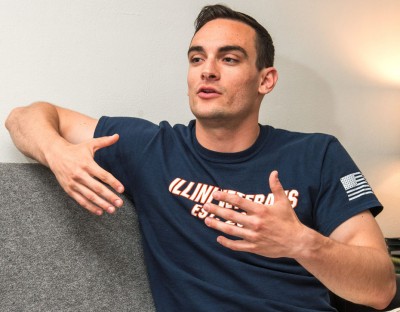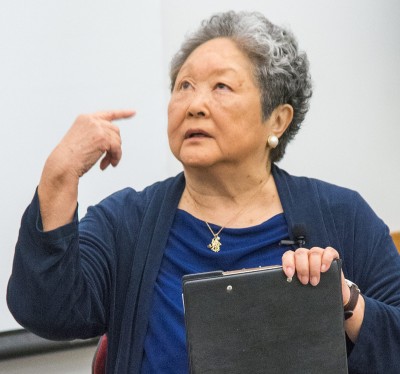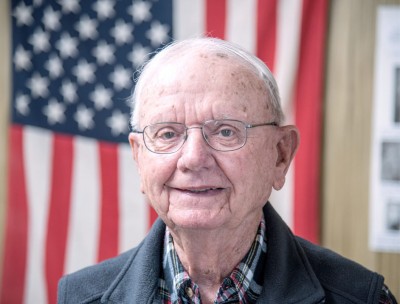Robert Rasmus
By Paul Wood

Photo By Rick Danzl/The News-Gazette
URBANA — Capt. Robert Rasmus worked with physical injuries as an Army medic, then psychological wounds as a mental health worker.
He came to the realization that sexual abuse was universal among the hospitalized women he encountered.
This was in the late 1970s, decades before the #MeToo movement, at a time when men joked about groping women.
Rasmus, 64, is now pastor at St. Matthew Lutheran Church in Urbana.
Straight out of school in North Dakota, he enlisted.
Part of it was to get a job in the then-new volunteer Army, and part was to honor his father.
“My dad was in World War II, all the way from Normandy to the Battle of Bulge. His unit was the first Allied unit to cross into Germany,” Rasmus said.
Like many veterans of many horrific wars, his father, who died relatively young, took his story with him.
“We never talked about it,” the pastor said. “He didn’t have a hole in him, but he died from the war.”
Rasmus was one of the first of the “new volunteer Army” after the draft ended in the last years of the Vietnam War.
“I enlisted in the Army on the day the Marine helicopters were pulling people off the embassy in Saigon” in 1975, he recalled, a day when many Vietnamese allies were left behind.
“I served on active duty for three years in the regular Army as a medic,” he said. “Mostly, I worked in mental health. As a combat medic, I got further training in that field.”
Most of his active duty was at Fort Gordon near Augusta, Ga.
“We took care of soldiers. Most of them were very young, of course, not Vietnam soldiers, but the new volunteers,” Rasmus said.
Some of them weren’t equipped mentally for the rigors of basic training and military life.
“We had a lot of sick kids in the hospital,” he said.
“People ask me, did you have a lot of PTSD? Most of that was being articulated in people who’d already been out of the Army — that was a VA job mostly.”
These were newbies.
“In those first couple of waves of volunteers, they had some real difficult times meeting their recruiting targets,” Rasmus said
Dealing with some of the troubled ones became a 10-hour job.
“We would get people from the early parts of the training in boot camp or a little after in individual training,” Rasmus said. “We had the whole spectrum of mental health issues, from psychosis to obsessive-compulsive behaviors to manic-depressives, or people who had drug overdoses.”
He saw some tragic cases.
“They’d do crazy things, like one who cut his tongue off, an OD. When he came back off the dope, he thought that was a really bad idea,” Rasmus marveled.
The volunteer Army included a much higher percentage of women than before.
Rasmus noticed problems that hadn’t been talked much about before.
“Here’s a strange thing,” he said. “There wasn’t a single woman, no matter how old they were, no matter what race they were, regardless of their upbringing or what part of the country they came from, every single woman who was admitted into our unit at one time or another had been sexually abused. There was a direct connection. Eventually, it became predictable.”
Rasmus spent three years in active reserve.
Then he went to the University of Minnesota, spending most of his time in journalism school before transferring into American studies.
He had a successful and busy career as a radio broadcaster in Iowa during the 1980s farm crisis, which gave rise to 1985’s Farm Aid.
Then he worked as a press secretary for a congressman he’d covered.
“In Washington, working massive hours, my chief of staff invited me to go to church,” he said. “Justice (William) Rehnquist came to the same church.”
In 1997, Rasmus served as an Army Reserve chaplain and was sent to Texas to do that work.
After some time and some soul-searching about faith issues, “It occurred to me, maybe I ought to do this for a living.”
He went to the Lutheran School of Theology in Chicago.
In 2001, he came to the Urbana church with his family.
Do you know a veteran who could share a story about military service? Contact Paul Wood at pwood@news-gazette.com.
Read more stories from local veterans:
 Caleb Carlson
CHAMPAIGN — Caleb Carlson is new to the University of Illinois, but he’s already served a couple of tours in Afghanistan …
Caleb Carlson
CHAMPAIGN — Caleb Carlson is new to the University of Illinois, but he’s already served a couple of tours in Afghanistan …
 Yuki Llewellyn
Yuki Llewellyn knows what it’s like to grow up in an interment camp. But she wasn’t held by the Germans or the Japanese. …
Yuki Llewellyn
Yuki Llewellyn knows what it’s like to grow up in an interment camp. But she wasn’t held by the Germans or the Japanese. …
 Bill Kirby
TOLONO — Bill Kirby picked up downed aviators from the sea during World War II, saving Americans, British and even Germa …
Bill Kirby
TOLONO — Bill Kirby picked up downed aviators from the sea during World War II, saving Americans, British and even Germa …